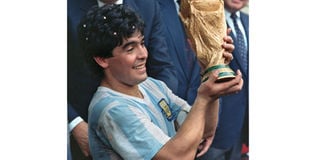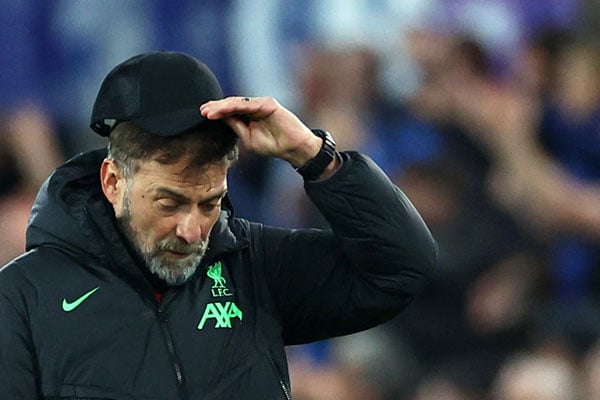I thought I knew Diego but I knew nothing

In this file photo taken on June 29, 1986 Argentine football star team captain Diego Armando Maradona displays the World Soccer Cup won by his team after a 3-2 victory over West Germany at the Azteca Stadium in Mexico City. PHOTO/AFP
What you need to know:
- Mr Guillem Balague says: He was injected with drugs to relieve pain from bad tackles.
It was less than a month ago that I wrote how Maradona had, against all odds, reached his 60th birthday. A day, I suggested, many had doubted this most complex of men would see.
As we mourn his passing, it seems almost irrelevant to say that we could all see this coming, that we knew his body was gradually giving up, and his mind was beginning to struggle, because somehow where Diego Armando Maradona was concerned, the normal rules never seemed to apply.
As much as I thought I knew Maradona, I realised once I began to research my book on him that I knew virtually nothing. There were 100 different Maradonas.
The magician, the cheat, the god, the flawed genius, the loving father, the serially unfaithful husband, the generous benefactor, the foul-mouthed oaf, and the man who made it to the top of the mountain and fell down it.
Diego didn’t look after himself well, but football, to its shame, didn’t look after him either. For years while he was playing, in Argentina, Spain and Italy, he was being injected with all manner of drugs to relieve the constant pain he was in, often without having a clue what was being given to him.
From the moment he joined Argentinos Juniors as a youngster, it was obvious that this was no normal player. Today his skills would afford him greater protection. Back then they merely served as the red rag of provocation that made him the victim of brutal challenges wherever he played.
Those challenges, many unpunished, left him to deal with a host of dreadful injuries and ensured he spent much of his life in crippling pain.
Among them, at Barcelona, was the notorious 1983 tackle by Athletic Club’s Andoni Goicoechea – nicknamed the Butcher of Bilbao. Maradona was left with a broken ankle. To this day, Goicoechea has a glass display case at home in which he keeps the boots he wore when he made that dreadful challenge.
The rules changed as a direct result of some of the injuries Maradona received. When I interviewed him a few years ago, he told me he thought players such as Lionel Messi owed him a great deal because some of the tackles he had endured would never be allowed today.
Maradona represented more than just a team but the hopes, dreams and aspirations of a whole country. Like in that quarter-final match against England in the WC 1986.
That Sunday in Mexico City, the world saw one man single-handedly lift the mood of a depressed and downtrodden nation into the stratosphere. With two goals in four minutes, he allowed them to dare to dream that they, like him, could be the best in the world. He did it, first by nefarious and then spellbindingly brilliant means.
In those moments, he went from star player to legend.
Diego was a rebel. He was a rebel who had power - and was prepared to use it for any number of good causes.
When he was with Argentinos, the club would play friendlies and use Diego as the star of the show to get payment. It was the era of the first colour televisions and all the players were desperate to receive their unpaid win bonuses so they could buy one. They only received their money, though, when the 18-year-old Diego told the Argentinos president that if they weren’t paid then he wouldn’t play.
He was a pioneer for so many people in the sport and for many aspects of the game. He was the first player to have a full-time agent, the first to have a physical trainer, the first to be prepared to shout from the rooftops his belief that Fifa was rotten to the core.
Napoli would prove to be his greatest club triumph but also the scene for his decline. He made Napoli and Napoli made him... and then they broke him. And he broke himself.
On the back of Argentina’s 1986 World Cup triumph, he led Napoli to their first Scudetto and became so famous he could not move without being pursued by fans and paparazzi – he resorted to taking cocaine in the toilet of his home.
He started to miss training and surrounded himself with sycophants happy to humour him along a dark path towards self-destruction while telling him how great he was.
He was already decaying.
“Just imagine,” he told me with more than a small sense of regret, “what I could have been, what I could have achieved if I had been clean.”
We will not see his like again.

Author: Guillem Balague. PHOTO/COURTESY.
Mr Balague originally published this abridged article in his column for the BBC Sport




